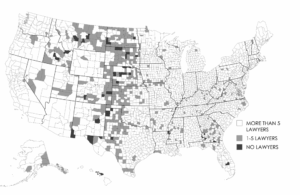This year’s summer solstice has passed, and the Fourth of July weekend has come and gone. Have you taken – or at least planned – a vacation yet this year? For many lawyers, the answer appears to be “no.” An American Lawyer 2025 survey of 3,000 lawyers revealed that while about 36% said they use all their vacation time, 10% of lawyers said they take no time off at all. A 2024 survey conducted by Law360 Pulse found that more than 20% of lawyers planned to take one week or less vacation that year. Associates were even less likely to take time off: almost one-third reported they planned to take a week or less vacation time.
Why does this matter? Because the aforementioned studies also assessed lawyer mental health generally, and confirmed what we have known officially since 2017 when the ABA National Task Force on Lawyer Well-Being issued its report: lawyers suffer from high amounts of stress that take a big toll on our physical and mental health, potentially leading to cardiac disorders, burnout, depression, anxiety disorders, or substance abuse. Chronic stress was reported by 38% of lawyers overall (and 47% of women lawyers) in the Law360 Pulse survey. Fifty-six percent of lawyers working more than 50 hours per week reported chronic stress. Although our awareness of the impact of stress on lawyer mental health has improved in the eight years since the ABA report, implementation of helpful policies to moderate stress has been slow.
So why don’t lawyers take more time off? Sadly, the culture at many firms tends to discourage or even penalize time off. Forty-seven percent of those surveyed by the American Lawyer said that their manager discouraged taking time off. One attorney reported that they didn’t want to go on vacation and have the firm see them as replaceable. Many lawyers cited pressure to make billable hours goals, client demands, not wanting to have work piling up while they’re gone, or a firm culture of being online 24/7 as preventing them from taking vacation time. Although associates may believe they can take some time off when they make partner, the extra demands of partnership may make taking time off an even bigger challenge.
While it is tempting to say that it is good for clients and for the legal profession to have lawyers available 24/7 for their clients, it is only a good thing if those lawyers are consistently at the top of their game. Probably this is not the case. Chronic stress has been shown to impair working memory, concentration, problem-solving ability, efficiency, social skills, and creativity – all skills necessary for good lawyering. Our brains need rest and relaxation to function properly over time, and vacations are a good way to interrupt chronic stress, relieve monotony, and let our brains reset, according to Susan Albers, PsyD, of the Cleveland Clinic. Vacations can decrease stress hormones like cortisol, and trigger release of hormones like serotonin, dopamine, and endorphins, all of which contribute to a better mood, a sense of well-being, and improved cognitive function. Although a week or more off is ideal, even a day or two of leisure time can make a positive difference.
It will be difficult to shift the culture of the legal profession in a way that normalizes taking time off to rest and rejuvenate. But lawyers are logical people, and for the most part we have our clients’ best interests at heart. As the evidence accumulates that leisure time is essential to mental health and optimum brain function, we need to spread the word, take some time off, and encourage our colleagues to rest as well. It’s in everyone’s best interests.


 Thanksgiving truly is an extraordinary celebration. Its invitation to pause and take inventory of the people whom and events in our life that we are grateful for quietly renews one’s spirit.
Thanksgiving truly is an extraordinary celebration. Its invitation to pause and take inventory of the people whom and events in our life that we are grateful for quietly renews one’s spirit.